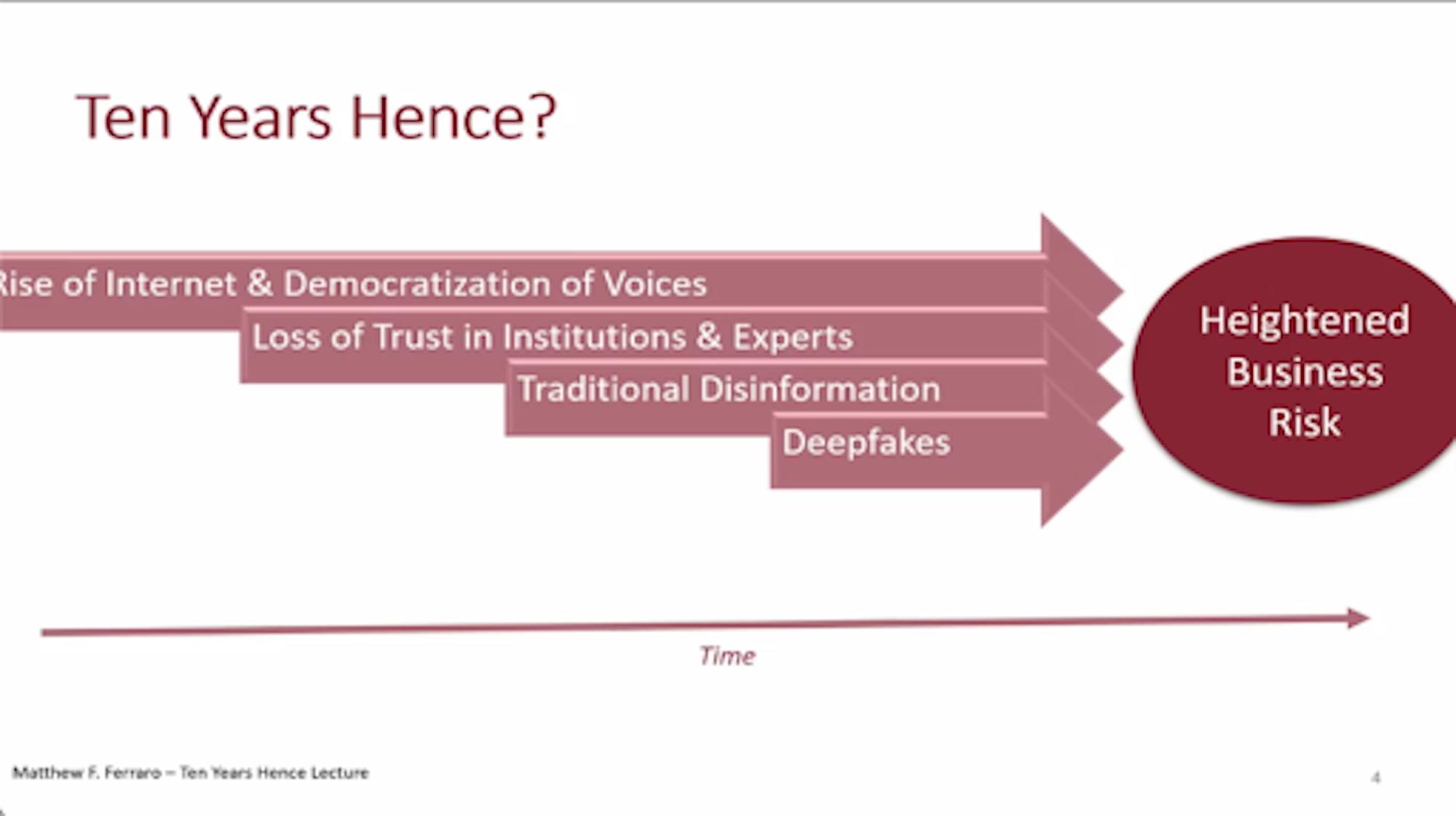Matthew F. Ferraro spoke at the Ten Years Hence Speaker Series 2021 on Friday, lecturing on the impact of fake news on businesses. Ferraro is currently a council member in the Washington D.C. office of Wilmer Cutler Pickering Hale and Dorr L.L.P., where he practices at the intersection of national security, cybersecurity and crisis management. He councils clients, writes and speaks on the threats that digital disinformation and deep fakes pose on corporations, brands and markets.
Ferraro began his talk — “News, Fake News and Deep Fakes. How Do We Know What’s True?” — commemorating the goal of Notre Dame’s Mendoza College of Business.
“Your mission to grow the good in business is needed now more than ever,” he said.
Speaking to students in pursuit of careers in business, Ferraro touched on the disinformation and dangers of politics, how these dangers will worsen over time and how media enhancing this work will harm private companies. He warned students to “be ready for these dangers because they’re ready for you.”
Beginning his lecture by addressing recent significant events in America, Ferraro touched on the role fake news played in what occurred in the Capitol on Jan. 6. In reviewing this day, he said the events that took place “prove that disinformation can have genuine consequences — it can poison minds and lead to disillusions of violence.”
“[M]any people that day were victims of disillusionment; they had been told lies, and they believed them,” he said.
This is only the simplest form of disillusionment, Ferraro said. Such violence “came from spoken lies.” He urged listeners to “imagine how much worse it could become if people on either side were to see a convincing video” to confirm their conspiracies.
Ferraro then transitioned to key drivers of this risk, citing “the rise of the internet and the democratization of voices, the attendant loss of trust in institutions and gatekeepers, the growth of traditional disinformation and the deep-fakes enabled by artificial intelligence agencies.” In this world, in 10 years hence or sooner, Ferraro believes “businesses risks will grow substantially.”
Ferraro explained deep-fakes, a term that is a “portmanteau of deep learning and fake news [... or] a piece of synthetic media — text, image, audio or video — that is either manipulated or wholly generated by artificial intelligence.”
“[The issue is that] technology is improving, and in two years, we think that humans will not be able to know the difference between what is real and what is not,” he said.
Deep-fakes are not incredibly hard to make, Ferraro said. They are a product of two computer systems called GANs that are adversarial networks — one network creates the image while the other network tries to detect it.
“There is a competition between the two until the detector, the discriminator, can no longer differentiate true from false,” he said.
Deep-fakes produce what Ferraro referred to as a “liars dividend.” As more people become “skeptical of video,” they are given more opportunities to gravitate towards their biases.
To highlight the severity of this issue, Ferraro addressed how many deep-fakes exist, referring to a report from the middle of 2020 that confirms, “there were 50,000 deep-fakes, and the number doubles every six months,” meaning there are about 100,000 deep fakes currently online.
The financial implications of this on businesses is “a serious issue,” Ferraro said; a study from 2019 revealed that “disinformation costs businesses 78 billion dollars a year.”
Ferraro said the top two risks to a business’ reputation are market manipulation and fraud. As normative tactics gain an increasing role in the business sphere, Ferraro explored how companies can prevent their costs proactively.
If need be, Ferraro said businesses can go to court to combat disinformation.
“When the facts and laws are on your side, go to court, and you will find success,” Ferraro said.
“We live in a seminal age for disinformation,” Ferraro said. In the past year, “people have become more willing to combat disinformation and see it is more than a petty annoyance.”
He argues for continuing practicing “good information hygiene,” for both business owners and the average person.













